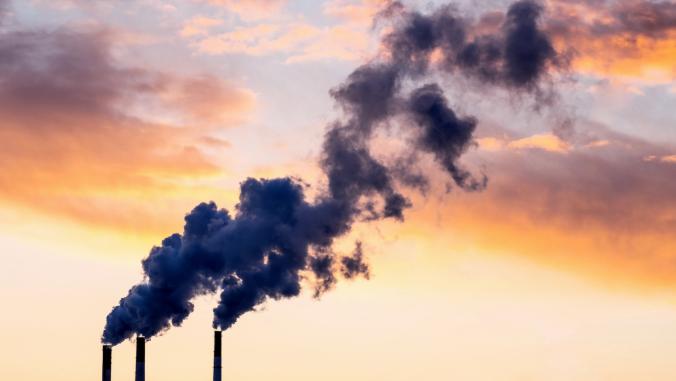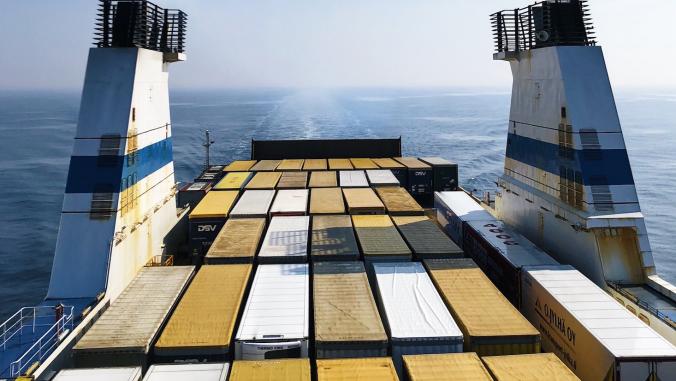How Asia Pulp & Paper learned to put down the chainsaw
<p>BusinessGreen Plus reveals how the company developed a sustainability strategy that has even won over Greenpeace.</p>

For more than a decade, few companies have experienced worse environmental press than Asia Pulp and Paper. The company may have been one of the largest suppliers of paper and pulp products in the world, but it had also become an environmental pariah, synonymous with forest destruction in Indonesia and Southeast Asia and the target of numerous high-profile Greenpeace campaigns.
But on Feb. 5, to the surprise of green NGOs and businesses around the world, APP published a new "Forest Conservation Policy," committing categorically to an immediate and permanent halt of all logging in natural forest areas. Crucially, the new strategy was wide-ranging and detailed, covered both APP and its supply chain, and included a commitment to third-party monitoring carried out by not-for-profit The Forest Trust. Perhaps most important of all, it also had the endorsement of the company's longtime tormentors, Greenpeace.
Last week, BusinessGreen Plus sat down with Aida Greenbury, managing director for sustainability and stakeholder engagement, and Scott Poynton, executive director of The Forest Trust, to discuss how this genuinely historic transformation came about and ask, if even APP can see the light and embrace sustainability, why can't all firms?
BG+: When was the decision taken to halt deforestation of natural forests and can you tell us a little bit about the process behind that decision?
Aida Greenbury: A lot of people thought this was the result of three months, six months or maybe a one-year project. It's not -- it's actually been a multiyear process. Back in 2010 we received a lot of input from stakeholders and we realized that our sustainability program just was not good enough. We needed to have a clear target of what we wanted to achieve. We launched our first draft of the sustainability program back in 2010. We did not make a big fuss about it, because it was intended as a living document that would continuously improve. We launched it in 2010 with targets for greenhouse gas emissions and some other goals and forest protection and everything else. And then we looked at it ourselves and shared it with some of our stakeholders and we realized, "It's not really good enough, is it?"
We showed it to Scott [Poynton] in 2011 and he just said, "What are you trying to do here? You are trying to rebuild trust. Well, there's a big elephant in the room you've totally ignored." And we said, "You're absolutely right." We realized there was a huge gap in our initial draft sustainability plan, and that was that our roadmap did not address the major calls from civil society. It was tiptoeing around it, and that wasn't good enough, it wasn't going to get us anywhere.
But at that time in 2011 I don't think we were ready to address the calls from the NGOs head-on, because simply we did not know what it would mean. We did not know what it meant to stop deforestation. We were not sure we could do that. Our business is about conversion: converting land into plantation, and then making pulp and paper out of it. We couldn't understand how to do what the NGOs wanted us to do. We didn't understand what the impact to our operations would be if we did what they wanted us to do.
BG+: How did you come to that understanding?
Greenbury: That was the moment when we looked at our sister company, Golden Agri Resources, the palm oil company. They were already working with Scott and TFT at the time and they had just launched their policy. We talked internally to the company and its shareholders about the impact on operations. That was when we decided we needed to engage with The Forest Trust.
BG+: How much pain was being caused for the business at this point by Greenpeace? There were customer boycotts -- I presume that when you start to lose sales this becomes very real to the business? Was that the main driving factor by the decision to change the sustainability policy?
Greenbury: There was a mixture of elements. The customers, the NGOs, the management of APP and the shareholders of APP -- those four elements were all key to the massive change in our sustainability strategy.
It was tough for us at the time when Greenpeace launched reports and attacked us and launched boycotts -- it was very tough for us. It was hard for us to understand and realize what they said might be true, we were slightly in denial. We were trying to justify what we were doing, but looking back without them doing that we wouldn't be here. It was important.
BG+: So you've reached a point were you are almost thanking Greenpeace for the protests and the boycotts?
Greenbury: Not almost, we thank them. We publicly say that we thank Greenpeace for their role in helping us change our strategy.
You can ask Scott. He's the external person here, I have been with the company 10 years, but he is an external party who has watched the whole process unfolding for two years.
Scott Poynton: There has been a real journey within the company. When we finally made the announcement on Feb. 5, I said to one of the shareholders that it was a shame that when we had first met two years earlier the meeting had not gone well and there had then been two years of pain and suffering that could have been avoided. But she said, "You know what, we just weren't ready then, it was not clear to us what we needed to do, we thought we were doing things right and Greenpeace was being unfair. It took us that time to come to terms and understand what we needed to do."
APP is a big operation, a complex operation, where if you stop doing that there it could have an impact over here. There were a lot of unforeseen things that could have happened, a lot of nervousness about that. But I think what we have been able to do with APP since we started to engage with them in February 2012 is not only spend my time in the head office engaging with the senior management team, but also have the field teams out in the bush getting data. They were able to say, "If you did that, this would be the impact." They were starting to be able to make forecasts and plan into the future based on solid information.
APP had some of this data themselves, it was not as if they had no information, but we were able to say, "Your data's right," or, "You could probably do this like this and it would have this result." So there was a lot of interaction between the technical teams that fed up into the policy process that we were discussing back in Jakarta.
BG+: How did that policy process evolve to a point where a commitment could be made to end all deforestation?
Greenbury: In June 2012, we launched our roadmap with our responsible procurement policy. That policy already had everything, HCVF (high conservation value forests), HCS (high carbon stock) compliance, the whole nine yards. But something was missing: We did not actually implement it across the supply chain; we just implemented it on a handful of suppliers who we had shares in. It was not good enough for anybody. Our supply chain is our responsibility, it doesn't really matter if we own it or we don't own it. If they are part of our supply chain, then it is our responsibility.
As soon as we launched our roadmap in June we have worked nonstop with TFT to find ways to accelerate the implementation of the policy across the supply chain, especially in Indonesia, in China and elsewhere. That was what we were doing, for six months we did not say much. We provided an update back in September, but at that point there was only two more concessions who were part of the acceleration process and that was just not enough -- we had to do 100 percent. So we had some discussion with Greenpeace and then we made the decision to stop all natural forest conversion in December.
Poynton: We had a meeting in early December to decide what would happen and then there were phone calls and messages to Greenpeace to tell them the decision. And then there was a meeting in Jakarta with Greenpeace Indonesia and there were some more emails and phone calls to clarify what was meant by certain clauses and to get the wording exactly right. We negotiated the agreement that would bring Greenpeace solidly to the table. We then had a videoconference call in the middle of December and agreed we would come together in January to more or less do the peace negotiation.
Out of that peace negotiation -- we were together for about two weeks -- came the final policy, which meant bulldozers off the land by Jan. 31 and then commitments to deal with the other substantive issues around peat, high carbon stock forest and degraded land. We wanted clear language in place around all those things -- it had been implied in our commitments, but we wanted to make sure everything was very clear and that was where the policy emerged.
The timing was perfect as the next quarterly update of the roadmap was due. It was actually due in mid-January, but we postponed it because we wanted to have a situation where APP could go to the launch saying not that the bulldozers would be off at some point in the future, which is what they have done in the past with their policies -- they wanted to be able to say, "the bulldozers are off."
Greenbury: That is a huge difference. In the past we did that and we missed the target. A lot of companies right now still have some kind of target to stop deforestation in 2020 or 2025. That is a difference between them and us. When we launched our decision to stop natural forest conversion, it was already stopped five days before. This is not some kind of target, we've done it. When we launched our policy there was no single chain saw cutting trees in the jungle. It is a very strong commitment.
Poynton: There are some smaller companies in South Africa that operate just with plantations, but there is no company in the pulp and paper industry of the scale of APP that is in this position now. The companies in North America use natural forest fiber. They have got plans to get out of it, but these targets are as far away as 2025. APP are now out of it and are delinked from deforestation. There is still some wood in the bush that needs to be brought in, there is still some stock in the mill yards that needs to be processed. But effectively as of Jan. 31, APP has delinked itself from natural forest clearance.
BG+: The big question is how do you now make this commitment work? How do ensure this does not impact the company's commercial viability?
Greenbury: A lot of work had been done before we made that announcement. We've done a lot of work on the growth and yield certification. TFT was working for months, verifying our plantation stock, checking the growth and yield of our existing plantation stock, and we have done something similar internally ourselves, and worked with Ata Marie, an independent forestry growth and yield expert group that is New Zealand-based, to verify our plantations. So we knew we had verified plantations. We knew we had enough plantation. Yes, we do need some more buffers, but what we have right now is enough and what more we need can be developed in areas where we do not convert natural forests.
BG+: The other big question is how do you enforce the new policy? How do you guarantee that you are no longer using timber from natural forests?
Greenbury: I can't guarantee. I can't guarantee smooth sailing going forward. Scott cannot guarantee that and nobody can guarantee that. We know there are going to be challenges, we know there are going to be bumps along the road, we know that. But the most important thing is we now have a process to deal with it should those challenges appear in the future.
We now have something called a grievance protocol that TFT and APP launched a few weeks ago. It's already been used. An NGO made a complaint that they thought there was some natural forest clearance still being carried out by one of our suppliers and we had our team in place to verify what was happening on the ground. We reported back to the NGO what they saw was not correct. Everything was fully transparent and the NGO was very happy the protocol had worked as planned.
BG+: And you have TFT to audit activity as an independent third party?
Poynton: That's right. This whole question of independent third-party auditors sometimes comes up and we've had some folks say, "Is TFT independent, given APP is paying you?" Well, all auditors are paid by the client they are working with. We are a U.K.-registered nonprofit, we've been working for 14 years, we work with offices in 16 countries, we've had forests certified all around the world -- we're pretty confident in our credibility.
But we recognize some people might scratch their chin over that. So, we've got 55 people in Indonesia but they can't be everywhere all the time, so what we want is for civil society in Indonesia to act as eyes and ears on the ground. What we've said to them is, "Here is the information, here is where the forest areas are, we've got our guys going round with GPS mapping the forest boundaries where they were as of Jan. 31." We can say, "Here are the maps, please help us to ensure these areas are protected."
I think this is going to be something that people look to in the future as a new model. This whole idea of independent third-party certification, I think, has got a lot of hairs on it. We've seen a lot of issues with auditors. But what we are saying here is don't rely on some paid third party, even though we are confident in our independence and credibility -- let's get the civil society involved and use them. It's a much broader stakeholder process and I think that is a model going forward in this and many other industries. We need to rely on those local guys on the ground to be our eyes and ears.
BG+: Does APP expect a commercial upside from this commitment? Are you now in a position to go to clients who boycotted the company and ask them to come back?
Greenbury: I don't see there being a commercial upside. We are doing this because this is the right thing to do. We are doing this because we need to, there are no other options.
BG+: I'm not suggesting it would be a negative thing to try and get commercial benefits. Is there not a case that companies should be rewarded for doing the right thing? You must now be in a position where you are competing with companies who aren't behaving in this way and that must be frustrating?
Greenbury: What we said, and what our chairman said when we announced this policy, is that we really expect other industry players to follow our steps. So if there are companies, whether they are competitors or not, who follow our steps we would be very happy about that.
Poynton: I think that the company, like any company, is a red-blooded organization that's interested in its business, and they do expect to get a commercial return from this, but they are not out there hunting it now. They recognize that they have to prove to the world that these policies are being implemented. It's not immediate -- the teams are out there in the bush doing a lot of work and the company will put out monthly reports on progress and keeping people posted that things are happening on the ground.
At the end of the day, APP is the second-largest pulp and paper company in the world because it has a good quality product and a good cost of production model. There are a lot of companies that got APP out of their business, and that cost them a lot of money and it hurt them. I suspect there will be companies out there that will watch this process for a couple of months and then when they feel that the monthly reports are coming out and there are no Greenpeace attacks anymore, then the phone will ring in the sales office and say, "Do you reckon we can have a chat?" Because they will be pretty keen to buy APP product again.
There are a number of pulp and paper companies in the world who have not necessarily been attacked by Greenpeace and they have benefited from people who have been exiting APP, but still having to buy paper. I suspect a lot companies are a bit nervous now, because APP was such a poster child and such a source of business for them that if APP is getting itself sorted out then clients could go back to APP. APP could make hay out of this if things go well. I believe the company did have a vision to do the right thing, they have a vision to be No. 1 in the world, but I reckon a lot of pulp and paper companies are pretty nervous right now, because while Greenpeace was beating up on APP they were winning a lot of business.
This article reprinted with permission from BusinessGreen.
Photo of deforestation in Indonesia provided by the Rainforest Action Network via Flickr.





